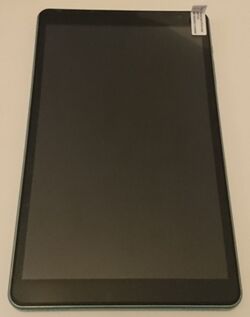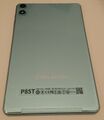Teclast P85T
| Teclast P85T | |
|---|---|
 | |
| Manufacturer | Teclast |
| Dimensions | 201.7mm x 122.4mm x 9.1mm, 340g |
| Release Date | 2023 |
| Website | P85T Product Page |
| Specifications | |
| SoC | A523 @ 1.8Ghz |
| DRAM | 4GiB LPDDR3 @ 792MHz |
| NAND | 64 GiB eMMC |
| Power | DC 5V, 5000mAh 3.7V Li-Ion battery |
| Features | |
| LCD | IPS panel, 1280x800 (8" 16:10) |
| Touchscreen | yes |
| Video | none |
| Audio | 3.5mm headphone plug, internal stereo speakers, internal microphone |
| Network | Dual band WiFi 6 (Manufacturer device), BT 5.2 |
| Storage | µSD, eMMC |
| USB | 1 x USB2.0 OTG via USB-C |
| Camera | 0.3MP front, 2.0MP rear |
One of the first devices with the Allwinner A523 (Cortex-A55 Octa-Core CPU). Should sell for around 80 USD. Surprisingly good look and feel (metal back) for that price class.
Identification
On the back of the device, the following is printed:
Teclast P85T
The PCB has the following silkscreened on it:
In android, under Settings->About Tablet, you will find:
- Model: P85T_ROW
- CPU Model: A523([email protected][email protected])
- Build Number: V1.04_20230907
Sunxi support
Current status
Not supported yet, but own code can be executed, and U-Boot/TF-A/Linux port is underway.
Images
Teclast provides official (PhoenixSuite) images, go to their Support/Software Download page. The Product ID Number you need for the download can be found in one of the photos below.
BSP
There are generic A523 BSP tarballs floating around, but nothing has been published yet. TinaLinux 5.4 BSP repos at GitHub contain some sun55iw3 code, although apparently from an earlier stage of development.
Manual build
You can build things for yourself by following our Manual build howto and by choosing from the configurations available below.
Mainline U-Boot
Not yet supported.
Mainline Linux kernel
Not yet supported.
Tips, Tricks, Caveats
FEL mode
The hole between the volume and power switch allows access to a reset switch, not to a FEL button. To enter FEL mode, dd a TOC0 version of fel-sdboot on a microSD card and restart the tablet with that. Any normal USB-C<->USB-A cable should do.
Please note that while this method brings you into FEL mode, this is running in non-secure SVC, so accessing the BootROM, secure devices (like the GIC) and secure registers (to switch to AA64) is not possible. Previous SoCs could be tricked back into secure state by issuing an smc call, but although this returns, the device is still in non-secure state. A MBROM disassembly suggests that exactly an SMC call, with r0 being anything other than 0x830000f? should work, but somehow it doesn't.
Enter FEL Mode via SD card
Build fel-sdboot.bin (requires arm-none-eabi-gcc)
git clone https://github.com/linux-sunxi/sunxi-tools.git cd sunxi-tools make fel-sdboot.bin cd ..
requires uboot-tools and openssl
openssl genrsa -out root_key.pem mkimage -A arm -T sunxi_toc0 -a 0x20060 -d sunxi-tools/fel-sdboot.bin output.toc0
flash
sudo dd if=output.toc0 of=/dev/sdX bs=1024 seek=8
Secure boot
The device has the secure fuse burnt, and the BSP Android is pretty nailed down. Fortunately the ROTPK hash is not burnt into the fuses, so any TOC0 image (as for instance created by mkimage) can be used to execute code. This allows full access to the CPU, so AA64 code can be run in EL3 this way.
xfel version
alex@ryzen-fast ~/d/a/xfel (master)> ./xfel version AWUSBFEX ID=0x00189000(A523/A527/MR527/T527) dflag=0x44 dlength=0x08 scratchpad=0x00061500
xfel extra efuse dump
alex@ryzen-fast ~/d/a/xfel (master)> ./xfel extra efuse dump
chipid:(0x0000 128-bits)
02c05200 91c04824 75744c18 38931ed1
brom-config:(0x0010 32-bits)
00000000
aldo-fix:(0x0014 1-bits)
thermal-sensor:(0x0030 64-bits)
01000000 00000000
tf-zone:(0x0028 128-bits)
0d290d35 0d590cd2 01000000 00000000
oem-program:(0x003c 160-bits)
08e18f10 052b808a f38fb900 00000048 00000000
write-protect:(0x0080 32-bits)
00000000
read-protect:(0x0084 32-bits)
00000000
lcjs:(0x0088 32-bits)
00000000
attr:(0x0090 32-bits)
00000000
huk:(0x0094 192-bits)
00000000 00000000 00000000 00000000 00000000 00000000
reserved1:(0x00ac 64-bits)
00000000 00000000
rotpk:(0x00b4 256-bits)
00000000 00000000 00000000 00000000 00000000 00000000 00000000 00000000
ssk:(0x00d4 128-bits)
00000000 00000000 00000000 00000000
rssk:(0x00f4 256-bits)
00000000 00000000 00000000 00000000 00000000 00000000 00000000 00000000
sn:(0x00b0 192-bits)
00000000 00000000 00000000 00000000 00000000 00000000
nv1:(0x0124 32-bits)
00000000
nv2:(0x0128 32-bits)
00000000
hdcp-hash:(0x0114 128-bits)
00000000 00000000 00000000 00000000
backup-key:(0x0164 192-bits)
00000000 00000000 00000000 00000000 00000000 00000000
backup-key2:(0x01a4 72-bits)
00000000 00000000
BSP Boot log
The BSP outputs some boot information via UART0 pinmuxed on the PortF pins 2 & 4, which can be accessed via a microSD breakout board without opening the device.
boot log from factory firmware
[140]HELLO! SBOOT is starting! [143]sboot commit : 0510558b5b [147]periph0 has been enabled [150]set pll end [151]PL gpio voltage : 3.3V [155]PMU: AXP2202 [159]PMU: AXP1530 [162]power mode:0, sys_vol:900 [169]dram_para_total:0x20 [172]vaild para:16 select dram para6 [175]sunxi_adb400_process [178]board init ok [180]rtc[3] value = 0xa202 [183]rtc[7] value = 0x2 [205]enable_jtag [207][mmc]: mmc driver ver 2023-03-24 16:23 [217][mmc]: Wrong media type 0x0, but host sdc2, try mmc first [222][mmc]: ***Try MMC card 2*** [247][mmc]: RMCA OK! [249][mmc]: bias 17fb [251][mmc]: mmc 2 bias 17fb [257][mmc]: MMC 5.1 [258][mmc]: HSSDR52/SDR25 8 bit [261][mmc]: 50000000 Hz [264][mmc]: 59648 MB [266][mmc]: ***SD/MMC 2 init OK!!!*** [271]DRAM BOOT DRIVE INFO: V0.6581 [275]DRAM_VCC set to 1200 mv [277]DRAM CLK =792 MHZ [279]DRAM Type =7 (3:DDR3,4:DDR4,6:LPDDR2,7:LPDDR3,8:LPDDR4) [287]DRAM SIZE =4096 MBytes, para1 = 30fa, para2 = 10007000, tpr13 = 6421 [296]DRAM simple test OK. [298]dram size =4096 [300]nsi init 2023-2-23 [401]read toc1 from emmc 32800 sector [404]OLD version: 0.0 [407]NEW version: 0.0 [410]don't have rotpk, skip check [421]load rotpk hash [521]load vbmeta_a-key hash [523]load vbmeta_a hash [526]load vbmeta_b-key hash [528]load vbmeta_b hash [531]monitor entry=0x48000000 [533]uboot entry=0x4a000000 [536]optee entry=0x48600000 [539]opensbi entry=0x0 [541]no need rotpk flag [543]tunning data addr:0x4a0003e8 [547]run out of boot0 NOTICE: BL31: v2.5(debug):5ddcbd3c7 NOTICE: BL31: Built : 15:36:49, Jun 12 2023 NOTICE: BL31: No DTB found. nsi init ok 2022-11-08 M/TC: OP-TEE version: 3dcc1a5a (gcc version 5.3.1 20160412 (Linaro GCC 5.3-2016.05)) #1 Fri Jul 7 07:01:54 UTC 2023 arm E/TC:0 0 switch crypto engine to mbedtls U-Boot 2018.07 (Sep 07 2023 - 17:30:25 +0800) Allwinner Technology [00.618]CPU: Allwinner Family [00.621]Model: sun55iw3 I2C: ready [00.644]DRAM: 4 GiB [00.649]Relocation Offset is: 6fa9b000 [00.700]secure enable bit: 1 [00.703]smc_tee_inform_fdt failed with: ffff000a [00.708]PMU: AXP2202 [00.710]BMU: AXP2202 [00.712][AXP2202] comm status : 0x0 = 0x38, 0x1 = 0xb3 [00.717][AXP2202] onoff status: 0x20 = 0x0, 0x21 = 0x0 [00.722][AXP2202] reboot/charge status: 0xf0 = 0x1 AXP2202_IIN_LIM:38 AXP2202_IIN_LIM:38 AXP2202_IIN_LIM:38 [00.734][axp][err]: b12_mode: 0 AXP2202_IIN_LIM:38 bias_name:pc_bias bias_vol:1800 [00.746]battery_check pass:radio:100, vol:4384 [00.752]PMU: AXP1530 [00.754]CPU=1296 MHz,PLL6=600 Mhz,AHB=200 Mhz, APB1=100Mhz MBus=396Mhz [00.760]gic: sec monitor mode sunxi flash map init SPI ALL: ready [00.767]flash init start [00.769]workmode = 0,storage type = 2 [00.772][mmc]: mmc driver ver uboot2018:2023-03-24 16:28:00 [00.778][mmc]: SUNXI SDMMC Controller Version:0x50500 [00.804][mmc]: Best spd md: 4-HS400, freq: 4-150000000, Bus width: 8 [00.809]sunxi flash init ok [00.812]drv_disp_init [00.818]handle_num : 13 erase secure storage failed [00.874]sunxi_secure_storage_exit err: secure storage has not been inited ** Unable to read file display_param.cfg ** lvds_clk_index = 0, disp = 0 fdt get node offset faill: /soc/lcd0_1 fdt get node offset faill: /soc/lcd0_2 fdt get node offset faill: /soc/lcd0_3 fdt get node offset faill: /soc/lcd0_4 fdt get node offset faill: /soc/lcd0_5 fdt get node offset faill: /soc/lcd0_6 request pwm success, pwm0:pwm0:0x2000c00. lvds_clk_index = 1, disp = 2 [00.950][DEBUG] primary_key: lcd0,okay,ret=2 [00.954][DEBUG] primary_key: lcd1,okay,ret=2 [00.959]lcd->hwdev_index: 1 [00.963]lcd->hwdev_index: 1 [00.966]lcd->hwdev_index: 1 [00.969]lcd->hwdev_index: 1 [00.973]lcd->hwdev_index: 1 [00.976]lcd->hwdev_index: 1 fdt get node offset faill: lcd4 [00.982][DEBUG] primary_key: lcd4,okay,ret=0 [00.986]skip lcd4 [01.024]boot_hdmi20: [info] hdmi_init start [01.028]handle_num : 4 [01.039]boot_hdmi20: [info] hdmi use inno phy! [01.043]boot_hdmi20: [info] hdmi_init finish [EDP_INFO]: edp0 probe start! g_edp_info[sel].irq = 176 FDT ERROR:fdt_get_regulator_name:get property handle vdd-edp-supply error:FDT_ERR_INTERNAL power_name:<NULL> parse fail! [EDP_INFO]: vdd_regulator:<NULL> FDT ERROR:fdt_get_regulator_name:get property handle vcc-edp-supply error:FDT_ERR_INTERNAL power_name:<NULL> parse fail! [EDP_INFO]: vcc_regulator:<NULL> [EDP_INFO]: edp0 probe end! [01.084]drv_disp_init finish [01.103]Loading Environment from SUNXI_FLASH... OK [01.110]boot_gui_init:start [01.112]set disp.dev2_output_type fail. using defval=0 [01.137]boot_hdmi20: [info] delay 20ms and re-get hpd state: 0. [01.162]boot_hdmi20: [info] delay 20ms and re-get hpd state: 0. [01.188]boot_hdmi20: [info] delay 20ms and re-get hpd state: 0. [01.213]boot_hdmi20: [info] delay 20ms and re-get hpd state: 0. [01.239]boot_hdmi20: [info] delay 20ms and re-get hpd state: 0. [01.245]set disp.dev_num fail. using defval=1 disp_devices_open start: 0 end: 1 dev_num: 1 actual_dev_num: 2 [01.255]===Lion LCD_open_flow=== clk_set_rate: <NULL> has NULL parent [01.270]===Lion 0000 lcd power on=== [01.496][LCD_panel_try_switch]: JLT080QI26184P31_21D18C g_switch_panel= 0,to_update_disp_num=1,to_update_index=0 [lcd_readid0]:num=1,entries=7,id=0x93,0x65,0x4 [01.610][fixup_lcdid_cmdline]:lcd_id_val=1108 [01.614][LCD_panel_try_switch]: JLT080QI26184P31_21D18C lcm_id_tmp= 6 pwm_request: err:this pwm has been requested! [01.678]===Lion LCD_open_flow=== [01.690]===Lion 0000 lcd power on=== [01.916][LCD_panel_try_switch]: JLT080QI26184P31_21D18 g_switch_panel= 1,to_update_disp_num=1,to_update_index=6 [01.959][LCD_panel_init]: JLT080QI26184P31_21D18C [02.125]set disp.fb0_rot_used fail. using defval=0 [02.129]set disp.fb0_rot_degree fail. using defval=0 [02.138]set disp.fb1_rot_use[02.141]<===Lion===>0000 LCD_bl_open [02.200]LCD open finish d fail. using defval=0 [02.204]set disp.fb1_rot_degree fail. using defval=0 [02.209]boot_gui_init:finish [02.213]bmp_name=bootlogo.bmp size 3072054 fb_save_para: fb_id(1) not open secure storage read hdcpkey fail [02.257]secure storage read hdcpkey fail with:-1 [02.261]usb burn from boot delay time 0 weak:otg_phy_config [02.271]usb prepare ok [02.546]usb sof ok [02.547]usb probe ok [02.549]usb setup ok set address 0x49 set address 0x49 ok [02.956]do_burn_from_boot usb : have no handshake skip update boot_param List file under ULI/factory ** Unrecognized filesystem type ** [02.970]update part info [02.992]get_bat_id_by_gpio value=1 [02.995][fixup_batid_cmdline]:bat_id=0 [02.999]bat_id=0,bat_cap_temp=5000 [03.002][fixup_batcap_cmdline]:bat_cap=5000 [03.006]battery temp is 188 [03.025]update bootcmd [03.028]change working_fdt 0xb5a4ae50 to 0xb5a1ae50 [03.033][mmc]: can't find node "mmc2" try sunxi-mmc disable nand error: FDT_ERR_BADPATH [03.043]The storage not support sample function fb_save_para: fb_id(1) not open ** Unable to read file display_param.cfg ** [03.144]update dts Hit any key to stop autoboot: 0 pubkey vbmeta_a valid CACHE: Misaligned operation at range [4fffffe0, 52c49020] ramdisk use init boot Android's image name: arm64 [03.771]Starting kernel ... [03.774][mmc]: mmc exit start [03.791][mmc]: mmc 2 exit ok NOTICE: [SCP] :wait arisc ready.... NOTICE: [SCP] :arisc version: [2.1V33-T2g-0a28fd3d0d-5fytri] NOTICE: [SCP] :arisc startup ready NOTICE: [SCP] :arisc startup notify message feedback NOTICE: [SCP] :sunxi-arisc driver is starting BL3-1: Next image address = 0x40080000 BL3-1: Next image spsr = 0x3c5 [ 0.000000][ T0] Booting Linux on physical CPU 0x0000000000 [0x412fd050] [ 0.000000][ T0] Linux version 5.15.94-android13-8-00002-g381b12479791-ab10457683 (build-user@build-host) (Android (8508608, based on r450784e) clang version 14.0.7 (https://android.googlesource.com/toolchain/llvm-project 4c603efb0cca074e9238af8b4106c30add4418f6), LLD 14.0.7) #1 SMP PREEMPT Fri Jul 7 16:27:54 UTC 2023 [ 0.000000][ T0] Machine model: sun55iw3 [ 0.000000][ T0] Stack Depot is disabled [ 0.000000][ T0] KVM is not available. Ignoring kvm-arm.mode [ 0.000000][ T0] earlycon: uart8250 at MMIO32 0x0000000002500000 (options '') [ 0.000000][ T0] printk: bootconsole [uart8250] enabled AW_Keymint_v2_CreateEntryPoint Gatekeeper_TA_CreateEntryPoint
Adding a serial port (voids warranty)
The shiny and slick metal case begs to not be opened ;-)
The BSP Android outputs some debug information over the PortF UART, which can be accessed via a microSD breakout board.
This section explains how to attach a serial port to the device. Make sure it refers to our UART howto. For a development board, you can just mention how to find the header with the pins and include a picture, and you can remove the warranty voiding warning.
Device disassembly
If necessary, provide a short description of how to open the device. Perhaps explain how the pins can be most easily popped. If pins do need to be popped, mention the Plastic tool howto.
Locating the UART
Describe how to find the RX,TX,GND signals here, and mention the UART howto.
Pictures
Also known as
No known rebadged devices.
See also
A sister tablet called Teclast P26T exists, with similar specs, but a 10" display, 128GB flash, and better cameras.
Manufacturer images
Enter Product ID from one of the photos above.




